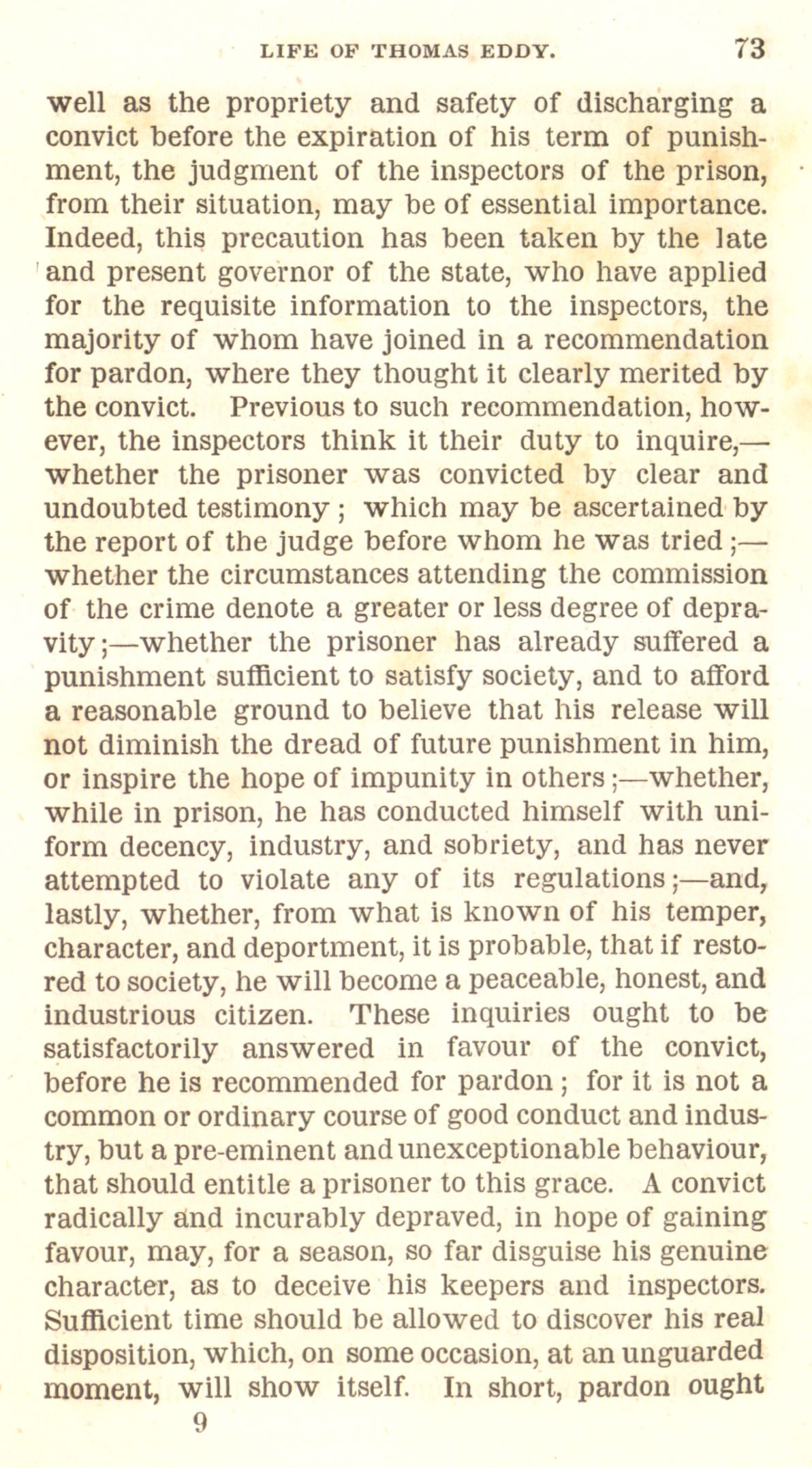well as the
propriety and safety of discharging a
convict before the expiration of his term of punish-
ment, the judgment of the inspectors of the prison,
from their situation, may be of essential importance.
Indeed, this precaution has been taken by the late
and present governor of the state, who have applied
for the requisite information to the inspectors, the
majority of whom have joined in a recommendation
for pardon, where they thought it clearly merited by
the convict. Previous to such recommendation, how-
ever, the inspectors think it their duty to inquire,—
whether the prisoner was convicted by clear and
undoubted testimony ; which may be ascertained by
the report of the judge before whom he was tried;—
whether the circumstances attending the commission
of the crime denote a greater or less degree of depra-
vity;—whether the prisoner has already suffered a
punishment sufficient to satisfy society, and to afford
a reasonable ground to believe that his release will
not diminish the dread of future punishment in him,
or inspire the hope of impunity in others;—whether,
while in prison, he has conducted himself with uni-
form decency, industry, and sobriety, and has never
attempted to violate any of its regulations;—and,
lastly, whether, from what is known of his temper,
character, and deportment, it is probable, that if resto-
red to society, he will become a peaceable, honest, and
industrious citizen. These inquiries ought to be
satisfactorily answered in favour of the convict,
before he is recommended for pardon; for it is not a
common or ordinary course of good conduct and indus-
try, but a pre-eminent and unexceptionable behaviour,
that should entitle a prisoner to this grace. A convict
radically and incurably depraved, in hope of gaining
favour, may, for a season, so far disguise his genuine
character, as to deceive his keepers and inspectors.
Sufficient time should be allowed to discover his real
disposition, which, on some occasion, at an unguarded
moment, will show itself. In short, pardon ought
convict before the expiration of his term of punish-
ment, the judgment of the inspectors of the prison,
from their situation, may be of essential importance.
Indeed, this precaution has been taken by the late
and present governor of the state, who have applied
for the requisite information to the inspectors, the
majority of whom have joined in a recommendation
for pardon, where they thought it clearly merited by
the convict. Previous to such recommendation, how-
ever, the inspectors think it their duty to inquire,—
whether the prisoner was convicted by clear and
undoubted testimony ; which may be ascertained by
the report of the judge before whom he was tried;—
whether the circumstances attending the commission
of the crime denote a greater or less degree of depra-
vity;—whether the prisoner has already suffered a
punishment sufficient to satisfy society, and to afford
a reasonable ground to believe that his release will
not diminish the dread of future punishment in him,
or inspire the hope of impunity in others;—whether,
while in prison, he has conducted himself with uni-
form decency, industry, and sobriety, and has never
attempted to violate any of its regulations;—and,
lastly, whether, from what is known of his temper,
character, and deportment, it is probable, that if resto-
red to society, he will become a peaceable, honest, and
industrious citizen. These inquiries ought to be
satisfactorily answered in favour of the convict,
before he is recommended for pardon; for it is not a
common or ordinary course of good conduct and indus-
try, but a pre-eminent and unexceptionable behaviour,
that should entitle a prisoner to this grace. A convict
radically and incurably depraved, in hope of gaining
favour, may, for a season, so far disguise his genuine
character, as to deceive his keepers and inspectors.
Sufficient time should be allowed to discover his real
disposition, which, on some occasion, at an unguarded
moment, will show itself. In short, pardon ought

